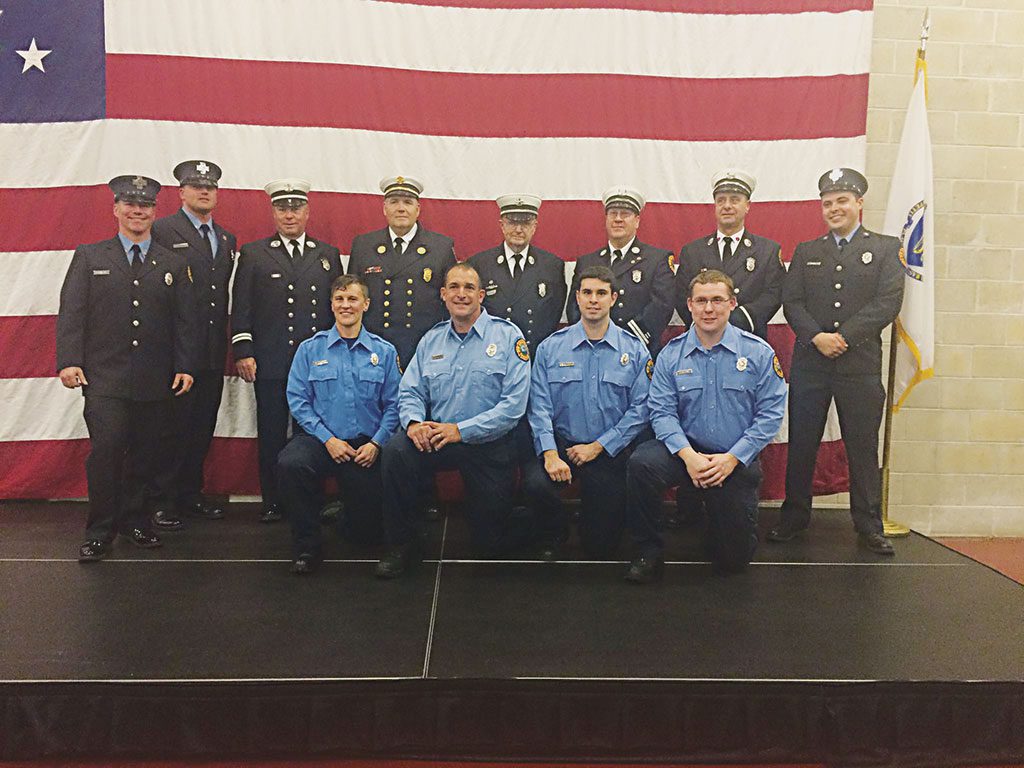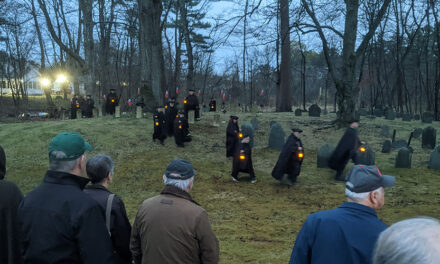Published in the December 9, 2015 edition

FOUR NEW Lynnfield firefighters graduated from the Massachusetts Fire Academy in Stow Nov. 9. Recruit firefighters participate in more than 300 hours of intense training. Once completed, they are certified level 1 and 2 firefighters. The graduating firefighters are (kneeling, front row): Suzy Lilakos, David Marengi, Steven Yobaccio and Jonathan Boone. Representing the Lynnfield Fire Department at graduation were (standing, from left): FF Richard Ripley, FF Daniel Veinot, Capt. John Walsh, Chief Mark Tetreault, Lt. (Ret.) MacDonald, Capt. Michael Feinberg, Lt. Ted Cohen and FF Steven Furey. (Courtesy photo)
By MAUREEN DOHERTY
LYNNFIELD — All three selectmen were supportive of a proposal made by Fire Chief Mark Tetreault Monday night to revamp the way his department is staffed. It will be the first major overhaul of the department in decades.
While all sides acknowledge that much ground remains to be covered on the specifics during the town-wide budget analysis season now through April Town Meeting, having all sides on the same page was considered significant progress.
Implementing the plan will involve collective bargaining and the town is entering a year in which the union contracts will be negotiated throughout town.
Tetreault first raised the issue of changing the staffing model last March during his formal FY ‘16 budget presentation to the board, but he was told that while the changes may be warranted, it was too late into the budget process to make the numbers work.
The Fire Chief is attempting reduce the strain currently placed on his department due to rising call volume while improving the average response time to emergencies.
He explained that Lynnfield’s hybrid department remains unique among North Shore communities and was based on an outmoded business model adopted back in 1971. It consists of a full-time career force that covers the town’s two stations during the day, five days a week for eight hours per day and relies on staffing callbacks with members of both the career force and the call firefighting force during the overnight hours.
“We’ve seen on the North Shore that many fire departments have abandoned their call fire department. If at all possible we should avoid that. I think our call force combination system provides a much higher level of service than our counterparts that no longer have call forces,” Tetreault told the board.
Tetreault has recommended increasing the staffing at both stations to seven days per week in 12-hour shifts from 7 a.m. to 7 p.m.
He stated that adopting this system would improve response times because when the stations are staffed the average response time is just over 5 minutes, but when they rely on callbacks to the station the response time jumps to just over 9 minutes.
Currently, this results in the career staff being eligible for overtime callback on 60 percent of the calls received. The 12-hour shift model would reduce overtime to 26 percent of the calls.
Providing weekend coverage at both stations would also reduce reliance on call firefighters and thus reduce conflict with family time, which is a huge factor in the retention of call firefighting staffs throughout the country, Tetreault said. He added having coverage at the station longer would also reduce the need for on call “platoon shifts.”
“Most importantly, the call company wouldn’t have to cover callbacks on the weekends for still alarms. Obviously if there is a fire everyone would come, but that would free up the weekends where we feel our call force is getting busier. Because we’re not calling back our call and career firefighters as often, there’s a costs savings of about $170,000, which can be reappropriated to shift-based work,” the chief said.
“By using a combination of career and call and part-time, we are saving about $90,000 in salary and about $66,000 in benefits. If we didn’t use any call firefighters or part-time firefighters, we would have to hire six career firefighters,” Tetreault said.
Tetreault said this is a working budget and the numbers could change. “The final cost is dependent upon the collective bargaining agreement. We’re working with the town administrator to start to iron that out…I know the career firefighters are very interested in this plan and understand the financial limitations of the community,” he said.
A full house of both career and call firefighters packed the hearing room for the presentation and Selectmen Chairman Phil Crawford thanked them for attending. He said the chief’s presentation provided information for the board to consider over the next few months but they were not prepared to make any decisions.
“As part of whole budget process we want to review everything and any changes we make we will vote on it at the appropriate time. I don’t think tonight is the appropriate time. We still want to study this. I think we have some answers,” Crawford said.
Crawford added, “We have to talk to our town administrator and see where the union might be on this and what changes we might be requesting to the current collective bargaining agreement.”
Andrew Lyons, President of the Lynnfield Firefighters Union, said, “as a union, without discussing the contract, we have, as a body, voted to support the chief’s plan on this. Obviously there will be some give and take on both sides, but we as a group are amicable to this. We think it is the appropriate step-by-step response to this problem. I don’t foresee collective bargaining to be a roadblock in this.”
We’re really struggling
Tetreault said the department and the town should continue to evaluate the effectiveness of the changes he has proposed and make incremental changes going forward. “We are making smaller changes that are more easily digested and absorbed by the community,” he said.
Selectman Chris Barrett commented, “But we’re using a model that was developed in 1971 and has seen little change since 1971 other than a recommendation in 2009 of incremental changes.”
Tetreault said the fact that this model has continued to work long after it has been abandoned in similar communities is “definitely a tribute to the members of the fire department. They held this together for a long time. Firefighters aren’t the type of people that ask for help. They just keep chugging, making it work and now we’re asking for help. We’re really struggling.”
Selectmen Tom Terranova, who is the liaison to the Fire Department, was also in favor of increasing the staffing. “When you brought this up last year it was too late in the budget season to make some changes last year, but this is great that you are bringing it up much earlier for everybody to discuss and do something positive with it,” he said.
“Certainly when anybody calls 911 they want the red lights and blue lights to show up as quick as possible. As far as I’m concerned, I’m willing to help you or Chief Breen get the staff there as quickly as possible. That’s job No. 1,” Terranova said.
“Job No. 2 is to do it within a reasonable budget so that it’s a win-win for everybody. You got your staff in there and keep the citizens of Lynnfield very safe and everybody’s happy,” Terranova said, adding that funding must also be available for the equipment to be properly maintained.
Terranova asked how many calls per day go to MarketStreet, whether it be for a fire call or EMS, and how many calls the department covered elsewhere each day.
Tetreault said the average is one call per day to MarketStreet and the average throughout town varies, but his department responds to “20 to 60 calls per week” or about “5 to 6 calls per day in total for everything.”
“I’m trying to look at where our growth is and associate the tax dollars that the town is receiving and make sure that they get appropriated correctly,” Terranova said. “If you need your staff here and they’re going to MarketStreet once per day and that cost us X number of dollars, we got to make sure we get that into your budget because that is all new revenue. And that new revenue should go to your department.”
Terranova also suggested keeping the stations open three additional hours per night, until 10 p.m., to further reduce the need for overtime callbacks. “Why don’t we try to remedy the majority of this timeline right now? If we are going to make a substantial change, now would be the time to do it while this issue was on the table.”
Tetreault said, “I believe the 12-hour plan, from the cost benefit analysis, is the most economical. I hadn’t looked at going further because the call volume seems to drop off at that time.” He added he’d be happy to look into expanding the coverage.
“The impression I got last year was we had to be more mindful of the budget. That’s why I went with 12 hours,” the chief said.
Terranova said he was looking to save on overtime by adding a few more part-time shifts to get the pay down to regular time.
Affect of Union Hospital closure
Resident Pat Campbell asked how the ramping down of the emergency services at Union Hospital in Lynn would affect the department and its response times getting to and from other area hospitals. “Can you consider that in your plans when you consider your needs?” she asked.
Tetreault said the biggest impact would be the time for the return trip from the hospital back to the station. “Everyone knows coming from Salem or Melrose-Wakefield at rush hour we are going to have a unit out of service for a lot longer. That ultimately will increase the opportunity to have simultaneous calls where one unit is still out and we have another call coming in,” Tetreault said.
Crawford said that during his meeting with the Lynn City Council and a meeting with the governor’s office, “the chief put together a summary of what it would mean to the town to have Union Hospital closed.”
Resident Arthur Bourque told the chief that he was “generally supportive of your proposal and I believe you are in need of more personnel. As a member of this Board of Selectmen approving MarketStreet we allocated three additional full-time firefighters and I think we’ve hired one since MarketStreet was built.”
Additionally, Bourque said an increase in the department’s workload can be attributed to more residential units from facilities such as Sunrise Assisted Living and the 200 apartment units at Lynnfield Commons.
“My concern is 60 percent of the calls are medical aid. The graphs that I have seen tonight show us hiring additional firefighters but not necessarily additional paramedics. One of the most significant costs that we have is full time paramedics coming back from off-duty in a response that is dictated by the union contract,” Bourque said.
“How do we reduce the cost that we have of these paramedics coming back to the tune of several hundred thousand dollars a year?” Bourque asked, adding, “I realize we need paramedics at these emergency medical scenes so how do we maintain the level of coverage that we have and reduce the cost to the taxpayers through this program? We have a very unique opportunity here to open it up and change the way we provide a service.”
Tetreault said, “It is much better to pay straight time than time and half. By covering 75 percent of the calls we are reducing the opportunities for especially the career paramedics to come back on overtime by 35 percent.”
As the negotiations move forward, Tetreault added, “I’m sure the Town Administrator has some ideas on the collective bargaining agreement that was designed for a different system.”




